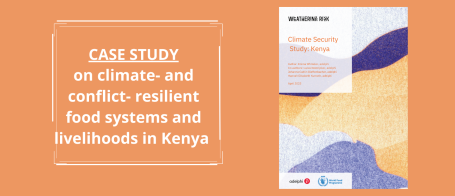Climate Security Study: Kenya
Download the full report here.
Kenya is experiencing a sixth consecutive failed rainy season, while the war in Ukraine and rising global food prices are further undermining food security. In the last two decades, Kenya has faced a rising degree of vulnerability to climate-induced hazards and risks – specifically continuous and protracted droughts, heatwaves and more frequent and intense flooding. Pastoral and agro-pastoral communities are most impacted by this, as these climatic changes lead to declining agricultural productivity, loss of crops and damage to vital infrastructure, seriously disrupting livelihoods beyond vulnerable communities’ capacity to cope. This has contributed to and can further risk competition for resources related to agriculture and pastoralism, thereby heightening the risk of conflict and food-related instability while undermining the physical safety of households and communities.
These cascading climate security impacts are most prominent in Arid and Semi-Arid lands (ASALs), which cover over 80% of the country’s land area, and where livestock and agriculture are the main economic drivers. In ASAL counties alone, it is estimated that the past five consecutive below-average rainy seasons have put an estimated 4.2 million people in urgent need of humanitarian assistance and in situations of acute food insecurity. Women and children are particularly impacted, as water scarcity and acute food insecurity have heightened the risk of sexual exploitation and gender-based violence.
For more than 60 years, the World Food Programme (WFP) has been embedded in communities most in need to bring-life saving assistance as well as supporting sustainable and resilient livelihoods. In Kenya, WFP works to tackle food insecurity and address shocks from climate and conflict. WFP has a strong footprint in ASAL counties where, working with communities, it aims to build climate resilient, sustainable and inclusive food systems.
In order to address the risks posed by climate change and conflict on livelihoods and food systems in Kenya, this report aims to facilitate risk-informed planning, enhance capacity for action, and improve operational responses that promote climate resilience and peace.
Share on


